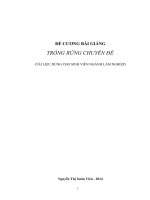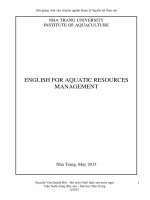unit 1 Bài giảng Anh văn chuyên ngành Tài chính Thư Viện Tài Liệu Tổng Hợp Com UNIT 1
Bạn đang xem bản rút gọn của tài liệu. Xem và tải ngay bản đầy đủ của tài liệu tại đây (144.92 KB, 10 trang )
The organization of the
financial industry
1
AIMS:
To learn about: the organization of the financial industry; key vocabulary
of banking products and services
To learn how to: express permission, necessity and prohibition
To practise: asking and talking about terms and conditions of bank accounts
Lead in
What services does your bank offer? Which of them do you use?
If you are still studying, what area of finance do you want to work in, and why?
If you are already working, what area of finance do you work in, and why? Would you like
to change your field of activity in the future, and why?
Has the institution or company you work for changed significantly in recent years? In
what ways?
Reading 1: Finance and Corporate finance
Read the following passage and choose the correct answer:
Finance is concerned with the providing funds to individuals, businesses and governments.
Finance allows these entities to use credit instead of cash to purchase goods and invest in projects.
For example, an individual firm can raise money through investors to buy a new factory.
Government can issue bonds to raise money for projects. Finance plays an important role in the
economy. As banks, credit, or other financial institutions providing credit, they help expand the
economy by directing funds from savers to borrowers. For example, a bank acquires large amounts
of money from the deposits of individual saving account holders. The bank does not let this money
sit idle, but instead provides loan to borrowers who might build a house or expand a business.
Corporate finance concerns with how businesses raise and spend their money. Companies
spend or invest funds in projects that might make the firm more profitable, such as a new factory
or an innovated product. Corporate finance involves selecting projects that maximize profits and
make the best use of a company’s funds. Sometimes businesses can fund these projects on their
own. Other times businesses must raise funds from the outside the company. Corporate finance
also involves finding the best way for businesses to pay for their projects.
Unit 1: The organization of the financial industry
1
1. Finance refers to offering funds to …………
A. individuals
B. businesses
C. governments
D. all of them are correct
2. In order to raise capital for projects, the government ………….
A. borrows money from the World Bank
B. imposes tax on small companies
C. increases interest rates
D. issues bonds
3. After getting large deposits from customers, the bank ………….
A. keeps them in its reserve
B. lends
C. pays employees’ salaries
D. buys foreign currencies
4. The financial institution is as an intermediary since ………….
A. it gets deposits from customers and then it provides loans to customers.
B. it operates between buyers and the sellers.
C. it takes capital from its reserve and offers to its creditors.
D. it interferes with financial activities.
5. Which of the followings do not belong to financial markets?
A. commodities markets
B. money markets
C. insurance markets
D. potential markets
6. Which entities play the role as an intermediary between lenders and borrowers?
A. Individuals
B. Banks
C. Companies
D. Bond markets
7. A corporate can raise capital by selling ……….. to investors.
A. assets
B. stocks
C. business plans
D. human resources
8. ………….. is a large company or business organization.
A. corporate
B. ownership
C. shareholder
D. stock
Vocabulary 1
You are going to read a passage of Peter Sinclair, the former director of the Centre for Central
Banking Studies at the Bank of England, about the financial industry. Before you read, check your
understanding of banking vocabulary by completing each sentence with a word from the box.
bonds
deposit mortgage shares takeover
capital
merger
pension
stocks
1. A ……………… is a loan to buy property.
2. Money you put in the bank is called a ………………………
3. Money paid to a retired person is called a ……………………
4. Securities representing part-ownership of a company are called …………. or ……………
5. The money invested in a business is its ………………….
6. …………….are interest-paying securities issued by companies that need to borrow money.
7. A ………………………. is when a company gains control of another one by buying its stocks.
8. A ………………………is when two formerly separate companies join together.
Unit 1: The organization of the financial industry
2
Reading 1: The development of the financial industry
Reading the passage of Peter Sinclair talking about the organization of the financial industry
25 years ago, and answer the questions below:
Well, twenty-five years ago the financial industry in most countries had two key
characteristics. One was that pretty well all the banks and financial institutions in that country were
owned in that country, and there were few international links - in many cases none. So they were
national banks belonging to that country. The other key feature was that financial institutions were
specialized, so in Britain we had institutions that lent to people who wanted to borrow to buy
houses - that means arranging mortgages - so we had specialized things called building societies
doing that. We had retail banks where individuals and companies kept bank deposits and which
made loans to cover short-term outlays and in some cases longer-term investment. Then we had
another range of institutions like insurance companies to provide life insurance or pensions, and
we had investment banks - sometimes called merchant banks. These weren't retail banks; they
didn't deal with individuals, they dealt with big companies. They gave the companies financial
advice, maybe arranging mergers, or fighting off a takeover bid, and helped to raise capital, for
example by issuing shares or bonds.
1. Were most financial institutions national, or international?
2. Were most financial institutions specialized, or did they offer lots of services?
3. What kinds of financial institutions traditionally did the following types of business?
Complete the table.
making loans
issuing shares or bonds
arranging mergers
arranging mortgages
providing pensions
arranging or fighting takeover bids
giving financial advice to companies
offering life insurance
receiving deposits
Retail banks
Building societies
Insurance companies
Investment banks
Unit 1: The organization of the financial industry
3
Reading 2: Going international
Peter Sinclair says about recent changes in the financial industry, and answer the questions below.
In the old days in Britain, the merchant or investment banks were pretty well all British and
there were big boundaries between building societies and insurance companies and all these other
types of companies. Well, now if you look at the picture, many banks have become universal
banks; perhaps 'banks' is the wrong word. Lots of institutions do all the things that I have just
described - insurance, mortgages, advice, raising capital for companies, and retail banking besides,
and the other great change is that so many of the financial institutions – and it is not just true of
Britain, true of pretty much everywhere else - are now international. So, for example in Britain,
two of the big four retail banks have changed ownership: one was taken over by Hong Kong and
Shanghai Bank, that was the Midland Bank previously, and it's now changed its name to Hong
Kong and Shanghai Bank and it really isn't a British bank any more; and another, National
Westminster, was taken over by the Royal Bank of Scotland. But if you look at, say, countries like
the Czech Republic or Hungary or Poland or New Zealand too, and plenty of other small countries
around the world, all their financial institutions pretty well are now owned by foreigners, by
German companies, or French companies or Austrian companies - whatever it might be - and the
huge international financial institutions are typically, though not all of them, American; and you
can now think of the City of London, the world's leading centre for foreign exchange dealings and
a great deal of finance, as rather like Wimbledon. In other words it's a great big international stage,
happens to be in London, but most of the players are foreign; they are nearly all foreign companies
that do, for example, the investment banking and so many other things. So internationalization and,
if you like, homogenization of these hitherto specialized financial institutions. Those are the two
big recent trends.
Questions
1. What has recently happened to banks in Britain and many other countries?
2. In what way does Peter Sinclair compare the City of London to the Wimbledon tennis
tournament?
3. Which two words does Peter Sinclair use to summarize the two big recent trends in banking?
Discussion
Has your bank changed in any of the ways described by Peter Sinclair?
Unit 1: The organization of the financial industry
4
Vocabulary 2
You are going to read about changes in the banking industry. Before you read, check your
understanding of the words (1-8) below by matching them with their definitions (a-h).
1. conglomerates
a. abolished or ended rules and restrictions
2. depositors
b. sums of money paid as penalties for breaking the law
3. deregulated
c. groups of companies that have joined together
4. fines
d. control of something by rules or laws
5. prohibited
e. guaranteeing to buy a company's newly issued stocks if no one else does
6. regulation
f. made it illegal to do something
7. repealed
g. people who place money in bank accounts
8. underwriting
h. cancelled or ended (a law)
Reading 3: Regulation and deregulation
1. Read the article, and complete it using the words (1-8) from the Vocabulary exercise above.
Regulation and deregulation
In the late 1920s, several American commercial banks that were (1) ……………… security
issues for companies weren't able to sell the stocks to the public, because there wasn't enough
demand. So they used money belonging to their (2) ………………… to buy these securities. If the
stock price later fell, their customers lost a lot of money. This led the government to step up the (3)
…………. of banks, to protect depositors' funds, and to maintain investors' confidence in the
banking system. In 1933 the Glass-Steagall Act was passed, which (4) ……………… American
commercial banks from underwriting securities. Only investment banks could issue stocks for
corporations. In Britain too, retail or commercial banks remained separate from investment or
merchant banks. A similar law was passed in Japan after World War II.
Half a century later, in the 1980s and 90s, many banks were looking for new markets and
higher profits in a period of increasing globalization. So most industrialized countries (5)
……………… their financial systems. The Glass-Steagall Act was (6) …………………. A lot of
commercial banks merged with or acquired investment banks and insurance companies, which
created large financial (7) ……………… . The larger American and British banks now offer
customers a complete range of financial services, as the universal banks in Germany and
Switzerland have done for a long time. The law forbidding US commercial banks from operating
in more than one state was also abolished.
Unit 1: The organization of the financial industry
5
In Britain, many building societies, which specialized in mortgages, started to offer the same
services as commercial banks. Yet in all countries, financial institutions are still quite strictly
controlled, either by the central bank or another financial authority. In 2002, ten of Wall Street's
biggest banks paid (8) ……………… of $1.4 billion for having advised investors, in the 1990s, to
buy stocks in companies that they knew had financial difficulties. They had done this in order to
get investment banking business from these companies - exactly the kind of practice that led the
US government to separate commercial and investment banking in the 1930s.
2. Put the sentences (a-d) below in the right order on the timeline, and write the time period that
each sentence refers to. The first one has been done as an example.
a. Major US banks were fined for giving bad advice to investors.
b. Commercial banks used their investors' money to buy securities and many depositors lost
money.
c.
Many banking regulations were ended and big financial conglomerates were formed.
d. New laws in the US and Britain separated commercial and investment banks.
1900
b-1920s
2000
3. Look at the following statements. Are they true or false, according to the article?
a. The Glass-Steagall Act was the result of the behaviour of investment banks.
b. The British and American financial markets are now completely unregulated.
c. German and Swiss banks did all types of banking business at a time when American and
British ones were not allowed to.
d. During the 20th century, many financial markets first became more regulated, and then
less regulated.
e. Large American banks no longer do the kind of things that led to the separation of
investment and commercial banking in the 1930s.
Discussion
o Which are the largest banks (or financial conglomerates) in your country?
o To what extent is banking regulated in your country? What are the advantages and
disadvantages of this?
Unit 1: The organization of the financial industry
6
Language focus
Permission, necessity and prohibition
A. The Reading article gives information about banking regulations - how banking is controlled
by rules. Look at the following sentences and underline the words that are used to describe
things that are permitted, necessary, not necessary, or prohibited (forbidden).
1. Although banks are allowed to open on Saturdays, most of them don't.
2. Banks aren't allowed to charge less than the minimum interest rate.
3. Commercial banks have to deposit part of their reserves at the central bank.
4. If you have a credit card, you don't need to pay cash.
5. If you keep at least $1,000 in the bank, you don't have to pay charges.
6. Today, retail banks need to react to competition from building societies.
7. Our policy states that we can't lend you more than one month's salary.
8. You can pay me back at the end of the month.
9. You must keep at least $1,000 in the account if you want free banking.
10. You mustn't use this loan for any other purpose.
11. You needn't go to the bank - you can do it on the internet.
B. Put the sentences into the correct columns, according to their meaning. The first one has been
done as an example.
Meaning
Permission
Sentence number
1
Verbs used
Necessity or
obligation
No necessity or
no obligation
Prohibition
Be allowed to
These verbs change if we talk about the past:
Present
Past
can / can't
must
mustn't
is / are [not) allowed to
has / have to
doesn't / don't have to
need to
needn't / don't need to
was / were [not) able to OR could / couldn't
had to
was / were not allowed to OR couldn't
was / were[not)allowed to OR could / couldn't
had to
didn't have to
needed to
didn't need to
Unit 1: The organization of the financial industry
7
Examples: - I had a credit card, so I didn't need to pay cash.
- I had to keep $1,000 in the account.
C. Complete each sentence using a verb. Look back at the Reading and Listening exercises to
find the information you need.
1. In the 1970s, US commercial banks ……………….do business in more than one state.
2. Today, US banks ……………….operate in several states.
3. Today, American banks …………………be specialized any more.
4. For most of the 20th century, commercial banks …………………issue shares.
5. Banks ………………….sell stocks to their own customers if it is not in the customers'
interest.
6. Today, building societies …………………….restrict their activity to mortgages.
7. German banks were always ……………………do business with both large companies and
small individual customers.
8. Before deregulation, foreign banks …………………operate in many countries.
9. Even after deregulation, banks still……………………. obey a lot of laws.
10. Twenty-five years ago, most banks ………………….worry about foreign competition.
Unit 1: The organization of the financial industry
8
New words:
− finance
→ financial
− prohibit
[,prouhi'bi∫n]
− former
: tổ chức
[,ɔ:gənai'zei∫n]
(n)
(n)
['fɔ:mə]
→formerly
(n)
(v)
[,insti'tju:∫n]
['eəriə]
(adj)
['fɔ:məli]
['kæpitl]
− deposit
[di'pɔzit]
→depositor
: trước đây, cũ
(adv)
(n)
:khoản tiền gửi (ở ngân hàng)
(n)
[di'pɔzitə]
(n)
[∫eə]
: (v) thế chấp ; (n) việc thế chấp
(n)
: tiền trợ cấp, lương hưu
(n) = stock
− to take over
: tiếp quản, tiếp tục
['prɔpəti]
− to retire
: cổ phần, cổ phiếu
(n) : sự tiếp quản (một công ty bằng cách mua đa số cổ phần của nó)
['teik'ouvə]
− property
: người gửi tiền
: việc hợp nhất
['mɔ:gidʒ]
['pen∫n]
− takeover
: vốn
(n)
['mə:dʒə]
− mortgage
− share
: thể chế, việc thành lập
: trái phiếu
− capital
− pension
(n)
: phạm vi, vùng
− bond (n)
− merger
cấm
: thuật ngữ, kỳ hạn
['ɔ:gənaiz]
→organization
− area
[fə'bid]:
(n)
[tə:m]
− institution
(adj)
(v) = forbid
[prə'hibit]
− organize
: tài chính
[fai'næn∫l]
→prohibition
− term
(n)
['fainæns]
[ri'taiə]
(n)
: tài sản, bất động sản
(v)
: nghỉ hưu
− securities
[si'kjuərətiz]
(pl.n)
: chứng khoán
− represent
[,repri'zent]
(v)
: tượng trưng cho, đại diện cho, trình bày
['ounə∫ip]
(n)
: quyền sở hữu
− ownership
− invest
[in'vest]
− interest
['intrəst]
(v)
: đầu tư
(n)
: lãi suất
− interest rate
: lãi suất
− to gain control
: giành được kiểm soát
− separate
['sepəreit]
(adj)
− specialize
['spe∫əlaiz]
− insurance
[in'∫uərəns]
(v) (in)
(n)
: riêng biệt, khác nhau
: chuyên về
: bảo hiểm
Unit 1: The organization of the financial industry
9
− society
− summarize
− recent
(n)
[sə'saiəti]
: đoàn thể , hội
(v)
: tổng hợp
(adj) Æ recently (adv)
: gần đây
['sʌməraiz]
['ri:snt]
− trend
: (v) có xu hướng về ,(n) xu hướng
− conglomerate
− regulate
− abolish
(v)
: bãi bỏ quy định
(v,n)
[ri'pi:l]
: hủy bỏ, bãi bỏ (một đạo luật)
(v)
['ʌndərait]
[ə'bɔli∫]
: khối kết
: điều chỉnh
[di:,regju'lei∫n]
− underwrite
(n)
(v)
['regjuleit]
− deregulate
− repeal
[kən'glɔməreit]
: nhận bảo hiểm (rủi ro)
(v)
: hủy bỏ
− restrict [ri'strikt] (v) Ærestriction[ri'strik∫n] (n) : hạn chế, giới hạn
− penalty
['penlti]
− confident
− merchant
− behaviour
(n)
(adj)
: toàn cầu
(n)
(adv)
[bi'heivjə]
[ri'zə:v]
: sự tin tưởng
: thương nhân
['gloubəlai’zei∫n]
['striktli]
: tin tưởng, tự tin
(n)
['mə:t∫ənt]
→globalization
− reserve
(adj)
['kɔnfidəns]
['gloubəl]
− strictly
: hình phạt, tiền phạt, tình thế bất lợi
['kɔnfidənt]
→confidence
− global
(n)
: chặt chẽ, một cách nghiêm khắc
(n)
: hành vi, cách cư xử
(v)
: dự trữ, đặt trước
− react (v)
− obligate
: phản ứng
['ɔbligeit]
→obligation
− characteristic
− feature
− outlay
: việc toàn cầu hóa
(v)
[,ɔbli'gei∫n]
: bắt buộc
(n)
[,kæriktə'ristik]
(n)
['fi:t∫ə]
['autlei]
(n)
: nghĩa vụ, bổn phận
:(adj) tiêu biểu , (n) đặc điểm
: nét đặc biệt, đặc trưng
: tiền chi tiêu, kinh phí
− to fight someone/ something off
: đẩy lùi, đánh bại
− internationalization (n)
: quốc tế hóa
− homogenization
− hitherto
[hɔ'mɔdʒinai’zei∫n]
[,hiđə'tu:]
(adv)
(n) : làm cho đồng nhất
: cho đến nay
Unit 1: The organization of the financial industry
10









